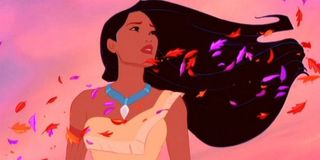Netflix Users Weren't Happy About This Description Of Disney's Pocahontas

Anyone who grew up in the 90’s – or any Disney fan in general – was most likely extremely pleased to find that Pocahontas finally made its way to Netflix recently. The film chronicles the triumphs and adventures of a young Native American woman during the colonization of Jamestown. However, some felt that Netflix missed the mark in their description of the film.
According to The Hollywood Reporter, Dr. Adrienne Keene found Netflix's description – a brief tag explaining the content of the film – incredibly sexist. She recently blasted Netflix on Twitter regarding their take on the classic Disney animated feature. You can see her Tweet for yourself below:
While one could technically consider the description accurate, it far from captures the essence of Pocahontas and its titular heroine. Keene expressed concern that all the description focuses on are the protagonist's romantic entanglements, as well as the fact that it "overly sexualizes" the film. Following the criticism, Netflix responded to her and stated that they agreed with her position and decided to alter the description in their library. Keene made an effort to state that lack of intentional wrongdoing on Netflix’s part, but the need to draw attention to the way stereotypical depictions of women can "sneak into our everyday lives." You can check out the new description of the film as it reads on Netflix below:
A young American Indian girl tries to follow her heart and protect her tribe when settlers arrive and threaten the land she loves.
Along with changing the description, Netflix got in touch with Keene and apologized for any offense their description may have caused, saying:
We do our best to accurately portray the plot and tone of the content we’re presenting, and in this case you were right to point out that we could do better… the synopsis has been updated to better reflect Pocahontas’ active role and to remove the suggestion that John Smith was her ultimate goal.
Over the years, Disney princesses have gone from mere damsels in distress to protagonists and heroes in their own right. Looking back on the early days of Snow White and Cinderella, many feminists have argued that those films reinforce the old fashioned concept of patriarchal society – Walt Disney himself has even been singled out by these accusations. More recent Disney animated features such as Mulan, Aladdin, and Pocahontas have endeavored to create strong, well-rounded female characters – who exhibit beauty without objectification and strength without masculinity.
CINEMABLEND NEWSLETTER
Your Daily Blend of Entertainment News
While this alteration may seem minor, it goes a long way towards depicting female characters with the accuracy and respect that they deserve. We know Pocahontas would approve.
Originally from Connecticut, Conner grew up in San Diego and graduated from Chapman University in 2014. He now lives in Los Angeles working in and around the entertainment industry and can mostly be found binging horror movies and chugging coffee.
Most Popular





